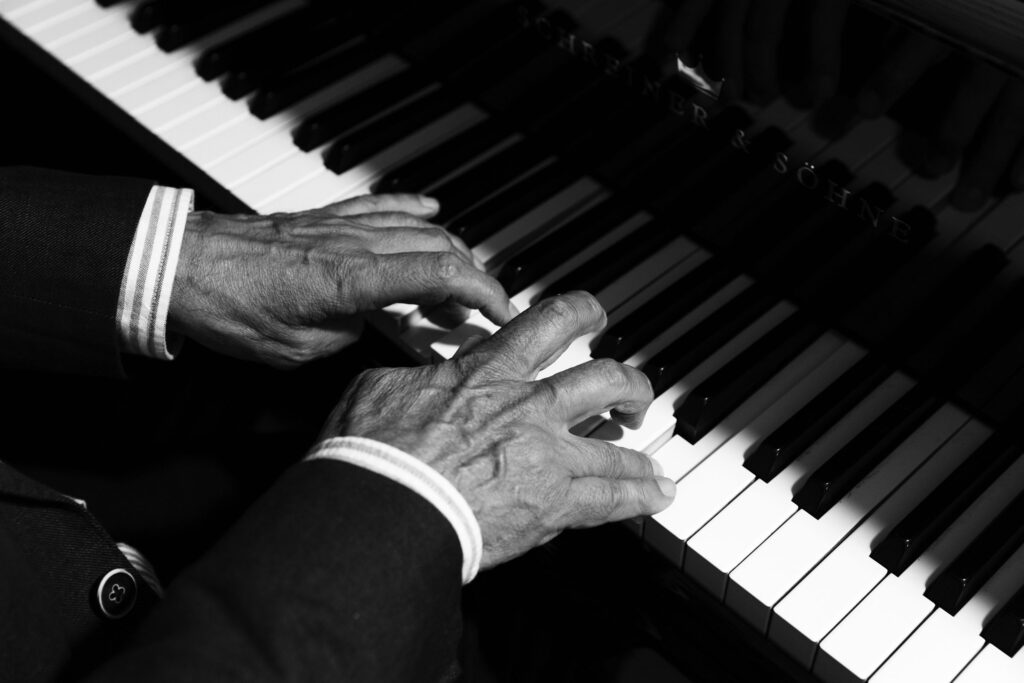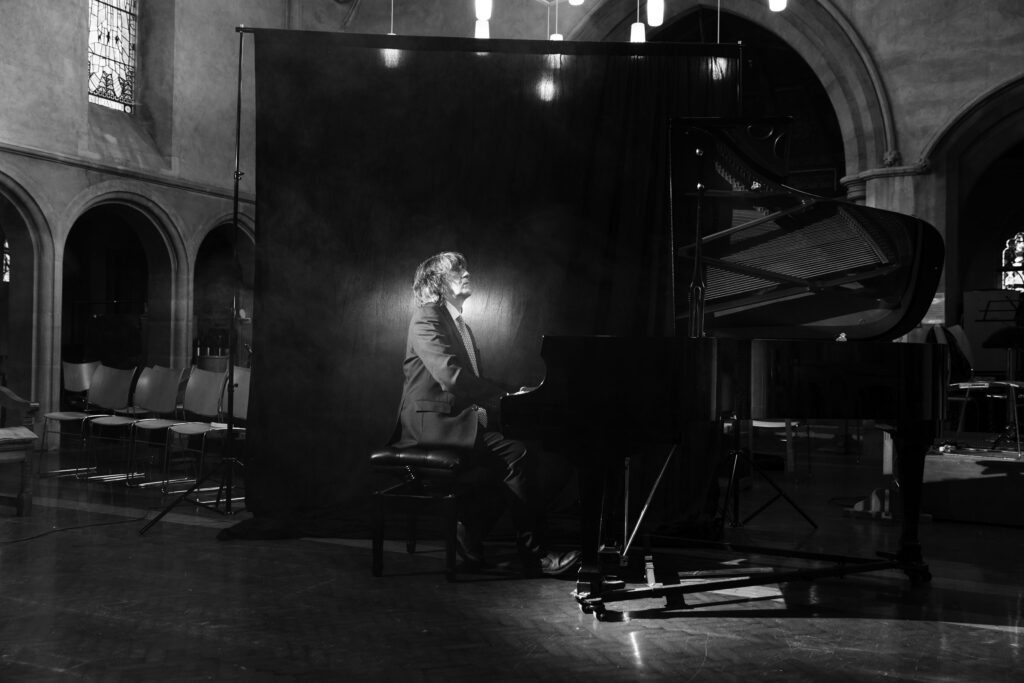Polo Piatti
Is he a mint with a hole? (No, but he does carry them around in his pocket). Is he a German hatchback or a game for posh people on horseback? No! He’s actually a genius Argentinian composer and pianist living in Hastings and he’s one of the loveliest people I’ve had the pleasure of interviewing.
Photography by Toby Shaw
Polo Piatti makes no apologies for creating melodic, catchy tunes and sophisticated earworms. He believes that the classical music world is full of prejudices and elitisms. Polo’s mission is to fight against this, one concerto at a time. I played his music in the garden recently while barbecuing, and my husband declared “This is the best stuff you’ve played all day!” (although to be fair, he says that whenever I turn Taylor Swift off). I played his music last week while my fourteen-year-old daughter had her friend round for dinner. “I feel really fancy eating pasta and listening to this!” her bestie said, looking very pleased with herself while my daughter eye-rolled me for embarrassing her, yet again.
I met with Polo Piatti at the Hastings Contemporary we went upstairs to the cafe with a view and we sat outside. It was sunny and quiet and the perfect conditions for conducting a recorded interview I thought. I was wrong. No sooner had I started to ask my carefully curated questions than the place was a hive of activity: there was a clattering of cutlery and cups and saucers, a man shouting ‘do you want sugar!?’ to his large, noisy party and the choooo choooo of the miniature steam train as it passed the gallery. It was a veritable orchestra of sounds and not quite the perfect conditions anymore, but it had to do.

Polo Piatti was born in Buenos Aires but he is not your typical Argentinian. “I don’t dance tango and I can’t play football. I cannot do anything but music… I can’t even change a lightbulb!” he laughed. He was sent to have piano lessons at the age of three and by the age of four, his teacher informed his parents of his natural talent. By the age of twelve, he was hailed as a child prodigy and sent to the most prestigious Conservatoire in South America, touring Brazil, Chile and Argentina, performing, and without seeing h
“I write music for the heart, not for the brain.”
I remember at the age of 13, entering a large city and seeing my face all over posters and billboards, it was stressful… wrong, I think. My parents didn’t see me perform in concert until I was eighteen”. Piatti does not come from an artistic or musical family at all , “I have no idea where it comes from,” he shrugged, “200 years ago there was a famous composer named Alfredo Piatti… but he has absolutely nothing to do with me!” I wanted to delve into Polo’s mission for melodies. “Basically music has a power and everybody knows that. A melody produces a very specific emotion and there is a resonance with the audience. When you make experimental, contemporary classical, you decide to go against harmony, against melody, and I am absolutely opposed to that. When you speak to many composers, they want to change society because they see the problems, they want to shock people and show the anger of the world.”
In the hoity-toity world of classical composing, Polo receives a fair amount of flack for his views. He is sometimes told that his music is predictable and easy. How does he feel about these criticisms? “I don’t care!” he says, “they play my music in the intensive care ward at The Conquest Hospital in Hastings because it makes people happy. I think we, as humans, have forgotten the power of music, melody, symmetry and rhythm. Nobody wants to pay good money going to a concert to experience how clever a composer is. Instead, we want to feel something, to be lifted, to feel inspired!” he says. “I write for the heart, not for the brain” he sums it up with.
Polo is completely focused on reflecting on how the world could be. In a world that is surrounded by ugliness, war, fear and hate, Polo has zero interest in reflecting reality. Instead, he feels the importance of creating a counterbalance, “it’s important for the soul, we have to recharge you know?” he says. “Our difficult times demand an antidote, offering emotionally charged, beautiful, passionate and tuneful music to recover and heal so much mental illness.”

He believes that creating beautiful melodic, harmonious music that people can recognise or hum along to, can contribute to making classical music become more accessible and therefore more popular with the wider public. “It’s a fallacy to suppose that you cannot show emotion by clapping in certain pieces or that you cannot dress in a specific way when attending a concert” he says.
In an attempt to achieve his mission, Polo founded and is artistic director of The International Composers Festival, bringing in composers and conductors from all over the world, and the Hastings Sinfonia, an orchestra that prides itself on being friendly and inclusive. No audition is required to join and it mixes good amateurs (grade 6 or 7) with professionals, as well as bringing in composers and conductors from all over the world. Its local concerts are very affordable and I look forward to attending one soon.
Polo’s latest CD, his Bohemian Piano Concerto, recorded by the National Symphony Orchestra, will be launched in October. Polo is currently working on his latest commission, a violin concerto. He is also writing his first ballet.
“Does writing specifically for someone to dance to make you think differently about what you’re creating?” I asked. “Yes. I am married to an actress who is a former dancer so that helps!” he says.
”You have to take into consideration that dancers get tired and you have to imagine the movement. It is a ballet set in an imaginary world, where the six main characters have to save the world for children who have lost their emotion. It’s a fascinating work and it will be quite magical. It should premiere next year in Japan”.
I asked Polo how he works and whether he uses digital programmes such as Sibelius: “I’m old-school. I write with pen and paper, usually sitting up on the East Hill. When I finish I go to a piano and check it” he tells me. I was astonished upon hearing this: contemplating the incredible skill that it must take to be able to imagine and hear the notes that you’re composing. “I then have to put it into Sibelius as many orchestras won’t accept hand-written manuscripts. I sometimes do commissions and I give them the signed manuscript, it’s more poetic”.

“Our difficult times demand an antidote, offering emotionally–charged, beautiful, passionate and tuneful music to recover.”
I asked Polo what brought him and his wife to Hastings. “We were living in East London and my wife and I used to come to the festivals such as Jack in the Green, Pirate Day and Old Town Carnival Week. We kept coming back and one day we said, shall we just sell the house and move here? We were so warmly received by our neighbours in the Old Town and that made it the best decision we ever made.”
“Are you inspired by your surroundings here?” I asked. “Absolutely!” he said. “Especially by the contrast between the fishing community and the amount of artists moving here from London. I love that completely diverse people happily live here side by side. It’s incredible. I can go to a cafe here and I feel like I’m in Paris. You can share a drink with someone and discuss politics or philosophy and talk about saving the world. That happens a lot here in Hastings.”
“Do people who have pianos at home keep inviting you round to dinner parties in the hope that you’ll play for them if they give you a bit of Malbec?” I asked, knowing full well that I have a piano in the hall and a bottle of Malbec in my drinks cupboard at home.
“Hah! I don’t even get given Malbec!” He joked. “One time I was invited over for Christmas with some friends here in the Old Town so obviously, I played for them. Somebody who didn’t know me was there and he came over to me afterwards and said you know, you should consider becoming a pianist, you could earn some money! Everyone in the house was laughing but I let him continue for a bit and then he came back to me half an hour later full of embarrassment.”
“Hah! I don’t even get given Malbec!” He joked. “One time I was invited over for Christmas with some friends here in the Old Town so obviously, I played for them. Somebody who didn’t know me was there and he came over to me afterwards and said you know, you should consider becoming a pianist, you could earn some money! Everyone in the house was laughing but I let him continue for a bit and then he came back to me half an hour later full of embarrassment.”
We were almost finished and ready to start our photoshoot, which we did partially in someone’s living room in St Leonards as they have a nice grand piano. Note to self – if you’re going to take all the pictures off someone’s wall, take a photograph first so you know where to put them all back.
It was a privilege to spend time with Polo Piatti. His talent, warmth and kindness should be bottled and sold. Maybe I should try and learn one of his piano pieces and then invite him round to listen while he drinks Malbec, I considered. I shall definitely give it a go but having watched and listened to Polo Piatti play, I doubt very much that my piano skills will let me.
Where can people listen to your music? On Spotify. And you can buy my sheet music from my website polopiatti.com
How can people get involved with Hastings Sinfonia?
You can apply to join the orchestra on hastingssinfonia.com. The Hastings Sinfonia Winter Concert takes place at the De La Warr Pavilion in Bexhill on 3rd December.
With thanks to the Bruce family and the use of their grand piano (sorry about the pictures, Audrey) and St John’s church on Pevensey Road. ⚫




